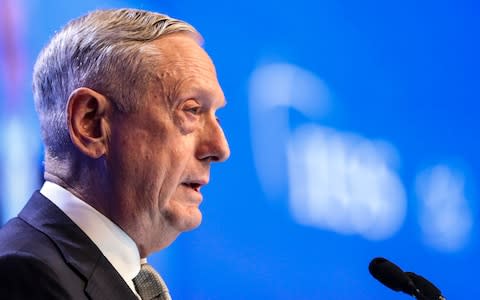US Defense Secretary Mattis accuses China of 'intimidation and coercion' in South China Sea

James Mattis, the US defence secretary, has hit out at China’s “intimidation and coercion” in the South China Sea and warned there would be “consequences” if it continued.
Mr Mattis accused Beijing of military build-up in the region and warned that the result of their actions will “come home to roost” if they do not stop.
Donald Trump appeared to endorse the comments, linking to them in a tweet and writing: “Very surprised that China would be doing this?”
But Chinese Lieutenant General He Lei issued a fiery response, saying that "irresponsible comments from other nations cannot be accepted".
The South China Sea has long been contested by America and China, with experts warning it could be the next theatre for geopolitical conflict in the coming decades.

Mr Mattis made the comments at an international security forum in Singapore - the site of Mr Trump’s meeting with North Korean leader Kim Jong-un on June 12.
Mr Mattis said: "Despite China's claims to the contrary, the placement of these weapon systems is tied directly to military use for the purposes of intimidation and coercion.”
He also criticised Chinese President Xi Jinping for reneging on a 2015 promise made at the White House that Beijing would not militarise the island features in the South China Sea.
China's reliance on military muscle to achieve its goals "is not a way to make long-term collaboration the rule of the road in a region that's important to China's future," Mattis said, when asked to elaborate.
"There are consequences that will continue to come home to roost, so to speak, with China, if they don't find a way to work more collaboratively with all of the nations who have interests," he added.
Responding to the comment, He Lei said: "As long as it is on your own territory you can deploy the army and you can deploy weapons.”

Delegates hoping for clarity on Trump's intentions for a scheduled June 12 summit with North Korean leader Kim Jong Un did not get much from Mattis.
He has steadfastly avoided weighing in on the issue, deferring questions to the State Department and Trump's national security team.
"On the Korean peninsula, we hold the line with our allies, supporting our diplomats who lead this effort," Mattis said.
"Our objective remains the complete, verifiable, and irreversible denuclearisation of the Korean peninsula."

